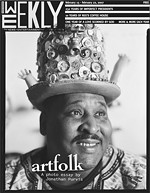PBS or just BS?
As one perceives the unmistakable wobble of an axle in the front fork of a vintage Schwinn three-speed rolling down 30th Street at an increasing velocity, he can tell when the wheel’s about to come off. The steering gets hinkier, the rattles get, well, rattlier, and sooner or later it’s time to start thinking about whether ‘tis nobler to go over the handlebars or lay the rig down at considerable risk to life, limb and epidermis.
All right, it’s a bicycle metaphor. Just because the wheels are coming off the rickety rig that is the Bush administration doesn’t mean we can’t make our telling points seasonally breezy.
That mandate Karl Rove and his crew conjured from last November’s ballots has vanished like, um, lightning bugs in a gated residential community. Dubya’s poll numbers are dropping faster than a fat baby’s sweat at a backyard barbecue.
You’re right. Enough of the summer similes.
Even though the Bushies are beset on unexpected fronts — previous supporters questioning Iraq strategy, the Schiavo autopsy backfire, still no John Dobson confirmation as U.N. ambassador — that doesn’t mean they can’t still work some partisan mischief in hopes of making us all more like them.
Consider how close the crusaders are coming to the holy grail of cultural repression, namely, eliminating public broadcasting.
For years an email has circulated around the internet invoking Nina Totenberg’s name and warning that Republicans were out to shut down National Public Radio. The email was malarkey, justifiably deleted whenever it was forwarded, and it was forwarded a lot.
However, along the way, a genuine threat to public broadcasting was gestating. It manifested itself June 9 when a House Appropriations subcommittee voted to cut all funding for the Corporation for Public Broadcasting within two years, the same move Newt Gingrich tried to make 10 years ago.
Is it payback for Postcards from Buster, the PBS kids’ show that showed a cartoon rabbit interacting with lesbians, or Now, a magazine-style program Bill Moyers used to host on Friday nights, a show that must have been left-wing because Moyers used to work for LBJ?
Subcommittee chairman Ralph Regula, an Ohio Republican, said no, “it’s not punitive in any way.” He then suggested public stations “make do” by getting more funding from private sources.
Hm. With a threatened $100 million CPB shortfall, Pledge Week in 2006 could turn into Pledge Year for our local public stations.
In a perfect world, NPR and PBS wouldn’t have to buss politicians’ booties to get money to operate, but even in an imperfect world, federal funds are important to public broadcasting operations because it’s money they can count on when they write their yearly budgets. Even noncommercial stations are affected by the current soft ad economy because companies that traditionally underwrite programming are starting to hold back those funds. A source of stable revenue is imperative.
Ken Tomlinson, the chairman of the CPB, apparently isn’t outraged by the subcommittee’s precipitous action. Instead of issuing a fiery denunciation of such a ploy, as an executive whose livelihood was threatened might, Tomlinson issued a statement saying merely that he was “concerned.”
If Ken seems uninterested in furthering public broadcasting’s agenda, it might be because he has an agenda of his own: making public broadcasting part of the GOP propaganda machine. An outrageous assertion? Along with CPB, Tomlinson is head of the Broadcasting Board of Governors, which oversees the Voice of America, the once-independent international service that has been pressured into broadcasting news reflecting only administration views, especially as regards Middle East reportage. (Check out Columbia Journalism Review Daily for more details.)
It’s not enough to have an actively partisan CPB chairman. CPB’s new president is likely to be Patricia Harrison, who put in plenty of camera time dogging out Hillary Clinton while co-chair of the Republican National Committee. (Her broadcasting experience? Manufacturing 59 pro-administration “news” packages for the Bureau of Public Affairs.)
Tomlinson, meanwhile, hired the White House’s director of global communications to hire two CPB ombudsmen to ride herd on PBS programming. Who’d he pick? William Schulz, his former co-worker at The Readers Digest, and Ken Bode, adjunct fellow at the conservative Hudson Institute. No problem with objectivity there.
With things looking grim, legacy-wise, for the White House, they must be glad to see things looking up at CPB. Their idea of a win-win situation: either they’ll starve public broadcasting to death or put it on a steady diet of right-wing gruel.
Only an ideologue would miss the point that publicly funded broadcasting is good for the public. By their very nature, commercial stations cannot risk airing controversial views because it would jeopardize their revenue. Only a station free from commercial pressure can present a variety of viewpoints, the kind of data that can make a citizenry better informed about public policy.
Bob Edwards, an award-winning newscaster who left NPR for satellite radio, nevertheless is still an advocate for public broadcasting. “Sponsors want everybody to be happy,” he recently told an audience in Fairbanks. “Controversy is going to alienate somebody. Sponsors don’t like that.”
Speaking of controversy, our boy Ken may be in for some. It seems he may have hired a GOP lobbyist for 10 grand without informing the CPB board, according to a Times report, an action which could be construed as a violation of its charter as an apolitical, nonprofit corporation. What’s more, Ken appears to have hired a guy in Indiana for 14 large, also off the books, to monitor liberal bias on Now. (Curiously, Tomlinson seems uninterested in monitoring conservative bias on PBS’s new Wall Street Journal Editorial Report.)
The squash is blooming and the solstice is at hand. Anyone up for a summertime game of “Follow the Money”?


